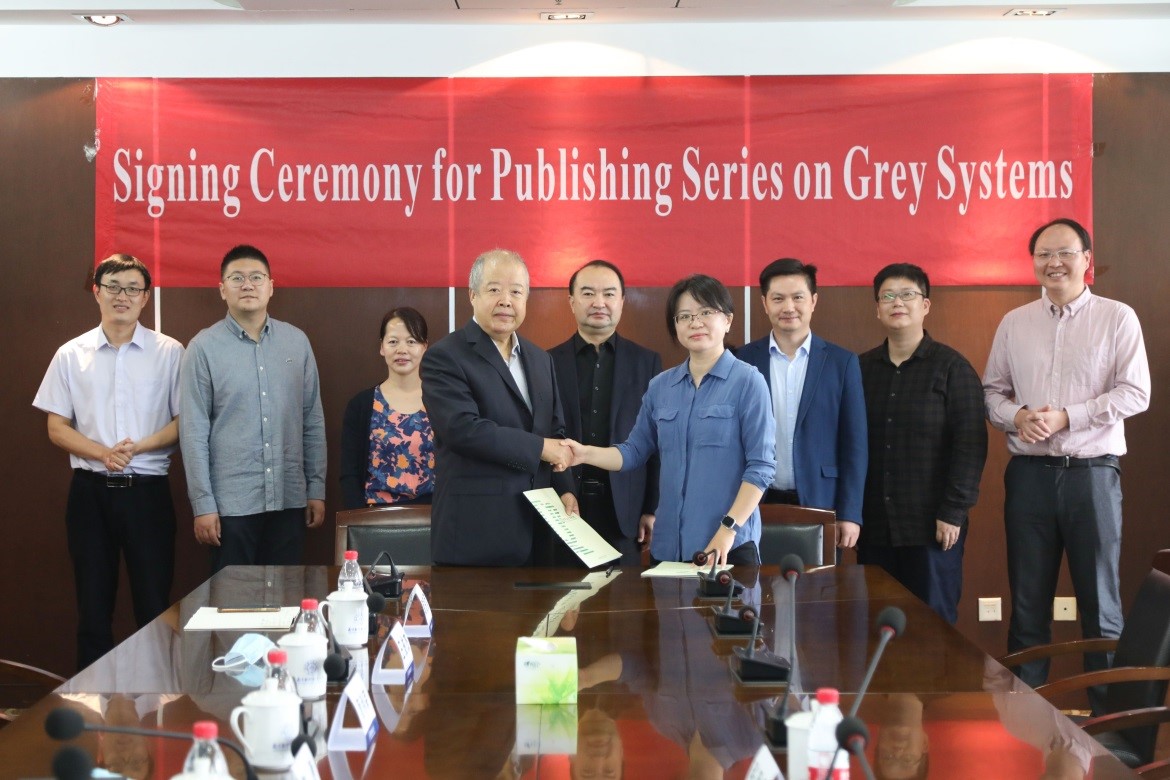
- Quick Search
- Citation Search
- Figure Search
- Advanced Search
The proposal of Series on Grey Systems submitted by Professor Sifeng Liu has passed the review of domain experts and approved by Springer-Nature Group.
On 13th October 2021, the signing ceremony for publishing Series on Grey Systems by Institute for Grey Systems Studies at Nanjing University of Aeronautics and Astronautics (IGSS-NUAA) and Springer-Nature Group was held in Nanjing. Professor Yong Tao, vice-president of NUAA, Ms Emily Zhang, senior editor of Springer-Nature Group in the Asia Pacific region, Professor Sifeng Liu, director of Institute for Grey Systems Studies at NUAA, and representatives of the faculty members and students from IGSS-NUAA attended the signing ceremony. The signing ceremony was presided over by Professor Naiming Xie, deputy dean of the College of Economics and Management of NUAA.

Professor Yong Tao warmly welcomed Ms Emily Zhang and deeply appreciate her for coming to NUAA to attend the signing ceremony for publishing the Series on Grey Systems and to support the research and global dissemination of grey system theory. He said that under the leadership of Professor Sifeng Liu, the faculty members and students with the Institute for Grey Systems Studies, always uphold the "innovative thinking, independent-spirit", just ploughing and weeding, pay no attention to their interests. They have deeply cultivated grey system theory for decades, achieved systematic innovative achievements, and successfully promoted grey system theory to the whole world. In September 2019, during the visit to China, German Chancellor Angela Merkel praised Professor Sifeng Liu’s work as "profoundly affecting the world." He believed that t the publication of Series on Grey Systems by Springer-Nature Group will greatly promote the international dissemination of grey system theory and is of great significance to further enhance the international academic influence of grey system theory as well as the university.
Ms Emily Zhang briefly introduced the establishment history and the rapid development of various businesses in the Asia Pacific region, especially in China in recent years of Springer-Nature Group. She mentioned that NUAA has a long history of cooperation with Springer-Nature Group and several generations of well-known experts with NUAA have published more than 60 excellent academic works by Springer-Nature Group, contributing their true knowledge to the development of science and technology in the world. In recent years, Springer-Nature Group has published a variety of grey system works by Professor Sifeng Liu, which have been massively downloaded and quoted by scholars all over the world, producing a wide international impact and playing an important role in promoting grey system theory to the world academic stage. Emily Zhang expects that the publication of the Series on Grey Systems will make a positive contribution to the international dissemination of grey system theory and further expand the international influence of this local original theory.
Professor Naiming Xie regarded that the research and development of grey system theory are inseparable from the strong support of leaders and publishing circles. As the most influential academic publishing group, after strict review and demonstration, Springer-Nature Group decided to launch the Series on Grey Systems. It has created a high-level platform for global scholars in the field of the grey system to display their achievements and contribute new knowledge. This is of great significance to the development and international dissemination of grey system theory. He firmly believed that the signing of the publication agreement will be recorded in the history of grey system theory as an important milestone.

After the signing ceremony, Ms Emily Zhang made a wonderful academic report for the participating faculty members and students. She introduced the main business scope of Springer-Nature Group to the participants, explained the precautions and review process for submitting a book proposal to Springer-Nature Group in detail, and answered the questions raised by the participants one by one.
It is reported that William Achauer, editorial director and Anil Chandy, vice president of books of Springer-Nature Group, who were unable to the scene due to the epidemic of COVID-19, have also completed the online remote signing process. The three books that passed the review in the first phase have also successfully completed the signing process of publishing contracts.
If you are interested in the series on grey systems, please contact Professor Sifeng Liu at sfliu@nuaa.edu.cn or Ms Emily Zhang at emily.zhang@springernature.com
Relevant background introduction:
Springer-Nature Group has a long history of more than 170 years and is a world-renowned academic publishing group. Springer-Nature Group provides the world community with high-quality content with various innovative products and services and is recognized as an important platform for the display, exchange and promotion of global scientific research achievements.
Grey system theory was initiated by Professor Julong Deng with Huazhong University of Science and Technology in 1982. Grey system theory deals with "poor information" uncertain systems that contain partially known information. Based on sequence operators and a variety of modeling techniques, grey system theory is committed to mining and extracting valuable information from some known information. Through this process, systems’ operational behaviors and their laws of evolution can be correctly described and effectively monitored. Thus, people can use mathematical models to realize "poor information" uncertain system analysis, evaluation, prediction, decision-making and optimal control. In the natural world, uncertain systems with small data and poor information exist commonly. This fact determines the wide applicability of grey systems theory.
The strong demand for poor information system modeling and analysis has injected vigorous vitality into the grey system theory. Since it came out in 1982, in the past 40 years, after several generations of hard work and careful care, the seedlings of grey system theory in the science garden have grown and expanded day by day. A new cross-sectional discipline has been widely recognized by the academic community because of its strong vitality.
Institute for Grey Systems Studies at NUAA has been founded in 2000 by Professor Sifeng Liu when he has affiliated with NUAA as a distinguished professor. IGSS-NUAA has now become the world centre for Grey System studies.
Over the years, under the leadership of Professor Sifeng Liu, scholars at IGSS-NUAA have made systematic and innovative achievements in the research of grey system theory. They successfully spread the grey system theory all over the world. They published more than a thousand academic papers, among which, exceed 300 are included in the ISI database, and more than 150 were published by JCR Q1 journals. Since 2004, both the number of publications on grey systems and the number of citations of IGSS-NUAA are ranked No.1 in the web of science for 18 years. According to the retrieval result by the database of China National Knowledge Infrastructure (CNKI), the literature on grey systems by IGSS-NUAA have been cited more than 60 thousands by other scholars and applied in every walk of life. Various editions of Professor Liu’s seminal book on Grey system theory were published in different languages such as Chinese, English, Romanian and Korean. Hundreds of universities from around the world adopted them as textbooks.
IGSS-NUAA edited and published a number of series of books and conferences proceedings with Science Press, Taylor & Francis Group, IEEE publishing group, Springer-Verlag, Henan University Press, Press of Huazhong University of Science and Technology and the Transactions of Nanjing University of Aeronautics and Astronautics. Professor Sifeng Liu serves as the editor-in-chief of two top international journals including Grey Systems: Theory and Application (Emerald, JCR Q1) and the Journal of Grey System (Research Information, JCR Q2).
IGSS-NUAA has initiated the establishment of international and national academic organizations such as the International Association of Grey Systems and Uncertainty Analysis (GSUA) and IEEE SMC Technical Committee on Grey Systems, and Grey Systems Society of China with the Chinese Society of Optimization, Overall Planning and Economical Mathematics, and hosted a series of international academic conferences such as IEEE International Conference on Grey Systems and Intelligent Services (GSIS), International Conference on GSUA, and Domestic Grey System Academic Conferences of China.
Many scholars from the USA, UK, Germany, France, Italy, Korea, Canada, Romania, Poland, Turkey, South Africa, Iran, India and Pakistan, etc. have joined IGSS as visiting professors, research fellows or for joint project research. In recent years, some young scholars from different countries joining Institute for Grey System Studies as PhD or Master students supported by Chinese government scholarship. It is helpful to promote the popularization and international communication of grey system theory.
Since 2000, more than two hundred PhD students, about five hundreds graduate students for master degrees graduated from IGSS-NUAA, and around forty post-doc. research fellows go out of the post-doc. station from IGSS-NUAA. Many of them become academic leaders, famed scholars or distinguished professors in different universities or research institutions. Each graduated alumnus become a seed that takes root in the new institution, then enlarge and spread one's power and influence gradually.
There are hundreds of projects on grey system research and its applications which proposed by faculty members or students at the Institute for Grey System Studies are granted by the National Natural Science Foundation of China (NSFC) and other national and local science funding agencies, or science funding agencies abroad, such as The European Union, The Royal Society of UK, as well as Leverhulme Trust, etc.
IGSS-NUAA is willing to cooperate with grey system researchers from all countries and regions in the world to jointly promote the prosperity and development of grey system theory research to benefit society and all mankind.